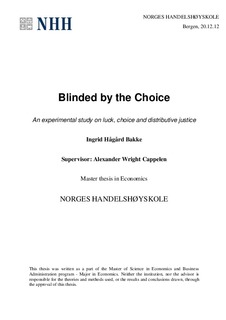Blinded by the choice : an experimental study on luck, choice and distributive justice
Master thesis
Permanent lenke
http://hdl.handle.net/11250/169469Utgivelsesdato
2012Metadata
Vis full innførselSamlinger
Sammendrag
This thesis aims to study moral motivation in economic decision making and to increase understanding of how we treat the element of choice when it comes to economic inequality and distribution of income. Most people agree that inequality caused by differences in choice and effort is acceptable. We also accept inequality caused by luck if we take the risk by choice. On the other hand, we feel that inequalities caused by factors beyond our control should be redistributed to a considerable extent. But what about all the grey zones in between, all the different combinations of luck and choices? The starting point for this thesis is that there exist choice situations that are mere illusions – situations involving choice where the decision maker have little or no control over the outcome despite the freedom to choose. From psychological literature we also know that people have a tendency to exaggerate the control that choices provide. Combining these features, we are interested in to what extent people assign responsibility to more or less meaningless choices.
This thesis analyses an economic experiment. In the experiment, a spectating dictator is asked to redistribute the total earnings of a two-person winner-takes-it-all lottery, where the detailed rules of the lottery vary across three different treatments. The results reveal that a choice illusion – luck that is covered up as a choice – in fact undermines the willingness to redistribute. Using a pure luck lottery as a baseline, we find that people transfer less from the lucky to the unlucky when an “empty” choice is introduced. We find that inequality is reduced substantially across all treatments, but that people redistribute less in the choice treatments.
